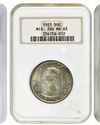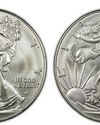
Gold rushes had a significant impact on American monetary policy and coinage during the 19th century. Together with a silver-mining boom, these gold rushes profoundly affected both the circulation of coinage and the United States Mint’s expansion. At the start of the 19th century, the nation’s single mint
At Philadelphia faced a severe shortage of gold and silver. Yet by the end of the century, the nation was awash in gold and silver and had seen the establishment of six federal branch mints and 20 short-lived private mints. When the Philadelphia Mint began striking coins in 1793, the United States had no domestic gold and silver sources and obtained its limited supply through foreign trade and by melting down the mix of foreign coinage then in circulation.
During the early 1800s, the Philadelphia Mint coined only about 25,000 troy ounces of gold per year. But production took a big jump in 1820 when the mint, thanks to its growing stockpile of gold from new mines in North Carolina, struck 263,800 Capped Head $10 half eagles from 118,712 troy ounces of gold.
FARM-BOY FIND MAKES HISTORY
The nation’s first documented gold discovery was made in 1799, when a farm boy near present-day Charlotte, North Carolina, found a baseball-sized rock that weighed an astounding 17 pounds. That rock served as a doorstop for three years until a goldsmith identified it as gold. The boy’s father, John Reed, then partnered with neighbors in a successful placer-mining venture that triggered the nation’s first gold rush.
This story is from the February - March 2021 edition of COINage Magazine.
Start your 7-day Magzter GOLD free trial to access thousands of curated premium stories, and 9,000+ magazines and newspapers.
Already a subscriber ? Sign In
This story is from the February - March 2021 edition of COINage Magazine.
Start your 7-day Magzter GOLD free trial to access thousands of curated premium stories, and 9,000+ magazines and newspapers.
Already a subscriber? Sign In

Top 6 Most Popular U.S. Commemorative Coins
During a half-century of researching U.S.commemorative coinage, I have found that these are the top six U.S. commemorative coins favored by collectors, dealers and investors.

GUIDE TO GRADING SILVER AMERICAN EAGLE ONE-OUNCE BULLION COINS
CAC'S MODERN COIN MINT STATE GRADING STANDARDS

TOP Jen U.S. Gold Coins
LIST OF STRONG PRICES AT SPECTACULAR AUCTIONS

$7,500 GOLD BY THE END OF THE DECADE?
\"Gold can easily triple by the end of 2030,\" declares Maurice H. Rosen, the prominent Plainview, New York, gold coin prognosticator and award-winning writer.

PCGS Coin Grading 101
In 1986, the numismatic world changed when Professional Coin Grading Service (PCGS) entered the scene as a third-party certification service to authenticate, grade and encapsulate coins at scale.

HOW TO USE THE COIN VALUES LIST
Coin values are provided beginning with small cents through Double Eagle gold pieces and beyond, and many of the popular modern coins in between, all based on The Insider's Guide to U.S. Coin Values, 21st Edition, by Scott A. Travers (www.usgoldexpert.com) and updated for accuracy.

THEINSIDER'S GUIDE TO U.S. COIN VALUES 23RD EDITION
ULTIMATE LIST OF COIN PRICES

Coin Dealers Attacked, Targets of Organized Crime
Coin dealers nationwide have become the latest victims of organized crime, facing targeted attacks following their attendance at coin shows.

Should You be Paying Sales Tax on Your Bullion and Coin Purchases?
THERE ARE MANY IMPORTANT EXCEPTIONS AND EXEMPTIONS

Physical Format Bitcoin Gains Collector Acceptance
PRICE RECORDS CONFIRM MARKET DEMAND